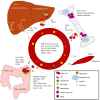Systemic inflammation in colorectal cancer: Underlying factors, effects, and prognostic significance
- PMID: 31496619
- PMCID: PMC6710177
- DOI: 10.3748/wjg.v25.i31.4383
Systemic inflammation in colorectal cancer: Underlying factors, effects, and prognostic significance
Abstract
Systemic inflammation is a marker of poor prognosis preoperatively present in around 20%-40% of colorectal cancer patients. The hallmarks of systemic inflammation include an increased production of proinflammatory cytokines and acute phase proteins that enter the circulation. While the low-level systemic inflammation is often clinically silent, its consequences are many and may ultimately lead to chronic cancer-associated wasting, cachexia. In this review, we discuss the pathogenesis of cancer-related systemic inflammation, explore the role of systemic inflammation in promoting cancer growth, escaping antitumor defense, and shifting metabolic pathways, and how these changes are related to less favorable outcome.
Keywords: C-reactive protein; Cachexia; Chemokine; Colorectal cancer; Cytokine; Glasgow prognostic score; Inflammation; Metastasis; Prognosis.
Conflict of interest statement
Conflict-of-interest statement: The authors declare that there is no conflict of interest.
Figures



References
-
- Hanahan D, Weinberg RA. Hallmarks of cancer: the next generation. Cell. 2011;144:646–674. - PubMed
-
- McAllister SS, Weinberg RA. Tumor-host interactions: a far-reaching relationship. J Clin Oncol. 2010;28:4022–4028. - PubMed
-
- Schreiber RD, Old LJ, Smyth MJ. Cancer immunoediting: integrating immunity's roles in cancer suppression and promotion. Science. 2011;331:1565–1570. - PubMed
-
- Balkwill FR, Capasso M, Hagemann T. The tumor microenvironment at a glance. J Cell Sci. 2012;125:5591–5596. - PubMed
Publication types
MeSH terms
Substances
LinkOut - more resources
Full Text Sources
Other Literature Sources
Medical
Research Materials

